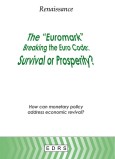Subtitle : How can monetary policy address economic revival? Renaissance (Rene Saens)
ISBN : 978-2-84930-050-3
Also available in French: « "L'Euromark" et les Solutions à la crise de l'Euro » de René Saens
Sous-titre : L'outil monétaire au service du "choc de compétitivité" ?
ISBN : 978-2-84930-011-4
 |
With deep concern of pedagogy, the author follows a detailed study of monetary tools and measures their impact on the economy. He doesn't hesitate to move beyond taboo issues to provide innovative economic and financial solutions and researches which could move the European Monetary Union out of the economic gloom.
French summary - Aujourd'hui la zone euro ne semble plus autant menacée d'explosion qu'elle le fut pendant de la crise financière des subprimes en 2008 ou encore en 2010-2012 lorsque la crise grecque, puis chypriote étaient à leur comble. Mais que dire des économies de l'Eurozone ? Est-ce que la situation est sécurisée pour autant ? N'avons-nous pas à nous protéger contre d'autres menaces, compte tenu de la surévaluation de l'Euro ? Quelles sont maintenant les perspectives économiques en termes de croissance et d'emploi dans l'Union monétaire européenne ?
Avec un sens aigu de la pédagogie, l'auteur se livre à une étude en profondeur, bien que très accessible, des phénomènes monétaires pour en mesurer les impacts sur l'économie. Cette approche permet de dépasser le stade des questions tabous pour ouvrir sur des solutions nouvelles et innovantes destinées à faire sortir l'Europe et l'Euro de la morosité économique dans laquelle semble s'installer un certain nombre de pays.
Discover
the book (Introduction) :
With the outbreak of the financial crisis of 2008, France and the
European countries have entered a zone of severe turbulence.
Today, our economies seem even more threatened, since the necessary
corrective steps have not been taken on time by politicians, most often
due to a lack of economic competence. Newspapers and media do not
maintain the desirable level of analysis either. They continue to
prefer polemics, leaving aside pedagogical development. Finally, the
lack of imagination and blockages from the trade union (employers and
employees) bring down an economic thinking, inherited from a bygone era.
The crisis has pursued its chaotic journey from 2008 until 2013. Is it
over? No. It is still ahead of us! Actually, the word crisis doesn't
seem to be the most appropriate term. What should it be? It is more
like a set of Russian dolls hidden in each successive picture. We have
to analyze and adapt. The
fact is that it is not so much the Euro which suffers than the
countries of the Eurozone. Let us finally broaden our minds to this
reality!
Within this context, what should one think about the
“competitiveness ‘shock” which stirs
successive
governments? Will elected politicians continue to promote bureaucratic
systems and gasworks, or pure nonsense for naïve or gullible
people waiting for recovery from an economic Messiah or a
providential bank governor? For Europe, isn’t it urgent to
get
involved in an economic and monetary policy to stimulate the economy?
Let us progress methodically. Before answering or suggesting an
alternative (Part 2), let us take the time to understand the mechanisms
which are at work (Part 1).
From the same author, in French : « Comprendre l'économie, l'euro, l'argente »
ISBN : 978-2-84930-011-4 Collection : Economie et société
© EDRS Tecinfor, 2014





